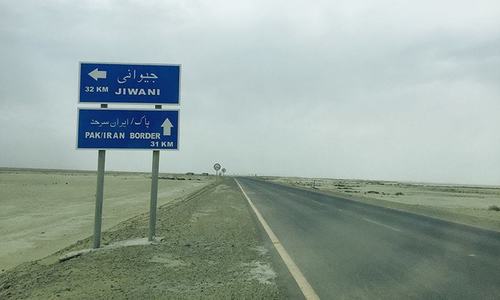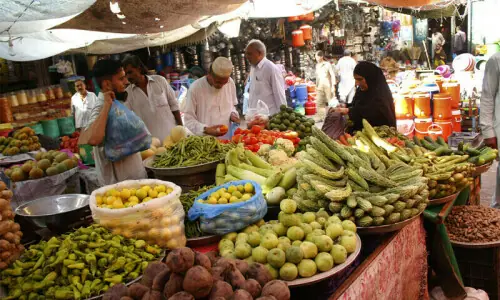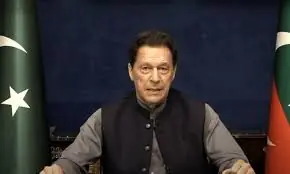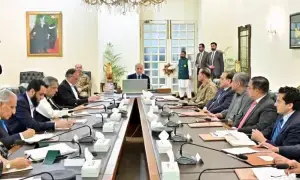
SMALL kids are washing clothes in front of a tube-well on a sunny hot Tuesday in Talaap, a town of over 50 houses in Chaghi district, in western Balochistan. The air has somewhat stopped in July, although Talaap is comparatively cold as compared to other parts of Chaghi.
Situated on the southern side of the Taftan border, Talaap used to be a peaceful and open border. There was irregular business, which has now come to nought following the building of a 32km wall from Taftan to Talaap. Unlike the past, Baloch can no longer intermingle with each other across the border, because the wall ends where there is no population. In a nutshell, the wall has not only curtailed movement, but also socially, politically, economically and culturally cut off Baloch families straddling across the border.
Adjacent to the wall, up to the Pakistani territory, the land is green. Baloch people always cultivate their lands, and there is, interestingly, presence of abundant water resources to the extent that the tiny Talaap town has been supplying water to the Saindak project in the areas for almost two decades. Hence, the locals are agriculturalists.
One of them is Sanaullah Baloch. He speaks in a low-pitched voice. The only reason Sanaullah is in Talaap is due to his cultivated land and livestock, otherwise he, too, would have left his ancestral town. “It used to be a wealthy border,” recalls Sanaullah about a steady stream of goods from Iran in the past. “Ever since Iran built the border wall, the border activity in Talaap, too, has stopped.”
A 32-km-long wall has separated Baloch families living on both sides of border with Iran
A few countries have built walls at their respective borders such as Israel. Similarly, a decade ago Iranian authorities unilaterally built a wall at its border with Pakistan. So much so, Iranian border forces reportedly fire into the populated bordering towns of Pakistan, sometimes followed by mortar fires and intrusions into Pakistani territory. According to Sanaullah, a couple of days ago Iranian security forces had fired at a pick-up vehicle, but thankfully no one was hurt.
Iranian security forces assume Baloch Sunni militants opposed to Iran find refuge in populations adjacent to the border. So they fire into populated areas, like Talaap. Disagreeing with this assumption, Sanaullah says there is nothing of the sort. “We have been living here for decades. We have never come across a single Sunni Baloch militant who is opposed to Iran in Talaap. All of us who live here are locals. Everyone knows each other simply because Talaap is a small town with the number of population in hundreds.”
‘Living in constant fear’
Pakistani authorities recently found an Iranian suspected drone in Chaghi district near the Talaap area, which had some technical problems and fallen down inside Pakistan. Chaghi district shares a border with Iran. In Balochistan’s another bordering district with Iran called Panjgur, in 2017, Pakistani authorities, too, had shot down a drone.
Iran is now pressurising Pakistan to fence its side of the border with Iran, which Pakistani authorities may have to do in the coming years.
“We are already at the mercy of Allah,” says Hameed Baloch, wearing tidy clothes. Encountering him on katcha road between Talaap and Taftan, he tells Dawn Iranian forces had recently fired at his camel. “If our country, too, fences the border, we will die from economic crunch. Because of the Iranian wall which has economically strangulated us.”
While in Talaap for a few hours, locals tell me about incidents of regular firings and mortar fires from the Iranian side which is why they now live under constant fear at the border with Iran. “At night, you cannot travel in a vehicle, on our side of the border, turning on its lights,” Hameed shares with Dawn. “You can be shot at from anywhere from the other side of the border. This is somewhat like these Iranian forces who are forcing us to vacate our own areas, on the side of Pakistan, so that there may not be populations adjacent to the Iranian border.”
Besides locals, security personnel also echo the same claims. According to them, these are attempts at bullying by the Iranian forces. “They shoot animals, too, if they find them near the border wall,” says security personnel.
As I roll down the window of my vehicle and take out my mobile phone to take a picture in Talaap, one of the security personnel cautions me. “Iranian security personnel are watching us from binoculars. If they spot a camera, they will fire from their check-posts.”
Published in Dawn, August 16th, 2019































